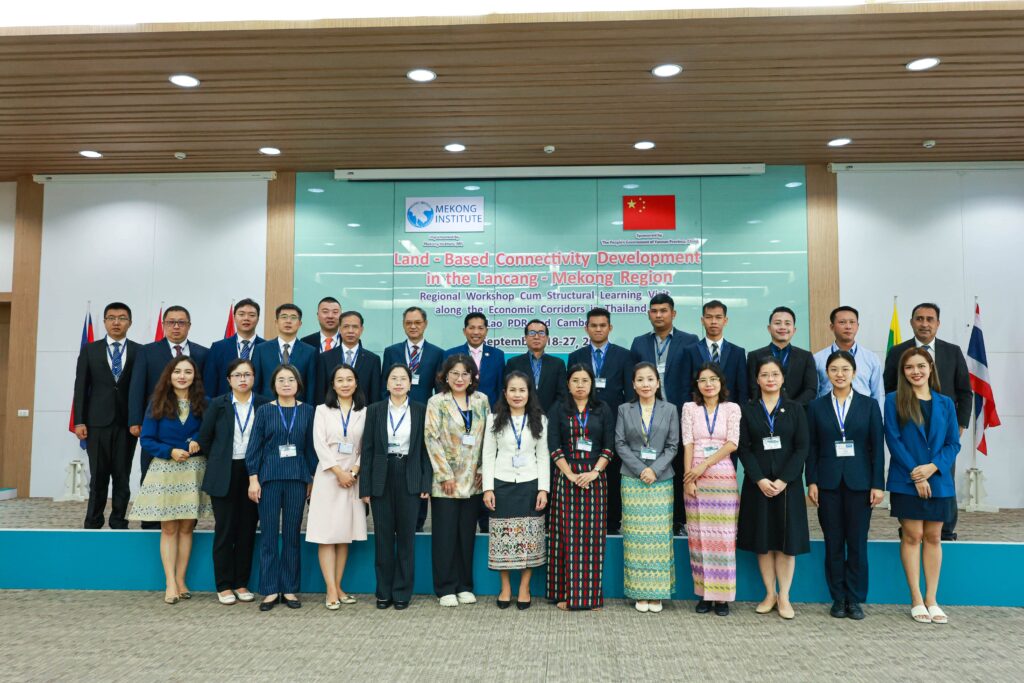September 19, 2024, Khon Kaen – Mekong Institute (MI) hosted a “Regional Workshop and Structured Learning Visit along the Economic Corridors in Thailand, Lao PDR, and Cambodia” to explore Land-Based Connectivity Development in the Lancang-Mekong Region. The event was attended by 24 government officials from various sectors, including planning and investment, commerce, transport, logistics, and policy-making, representing the six Lancang-Mekong (LM) countries.
Supported by the People’s Government of Yunnan Province, China, the event provided a platform for officials from connectivity-related governmental departments to conduct on-site assessments and engage with key stakeholders along the East-West Economic Corridor (EWEC) and South Economic Corridor (SEC). The aim was to enhance intra-regional trade and investment by leveraging improved land connectivity to transform economic corridors in the region.
This initiative focused on several objectives: identifying new cooperation opportunities related to land-based connectivity; generating ideas to capitalize on these opportunities; streamlining cross-border formalities to expedite inspection processes; and recommending ways to harmonize procedures and facilities at border crossings through improved coordination mechanisms.
The program began with a one-day introductory workshop on September 19, 2024, in Khon Kaen, followed by a week-long Structured Learning Visit (SLV) from September 20-26, 2024. This SLV included visits to key locations such as Mukdahan in Thailand; Savannakhet, Pakse, and Si Phan Don in Lao PDR; and Stung Treng and Siem Reap in Cambodia.
Opening the workshop, Mr. Madhurjya Kumar Dutta, Director of MI’s Trade and Investment Facilitation (TIF) Department, emphasized the importance of land connectivity for regional development and trade, particularly in light of China’s infrastructure investments. “The six Lancang-Mekong countries share a common geography, with agriculture being a primary industry that relies heavily on land-based connectivity. Strengthening this connectivity is essential for regional growth,” he stated. Mr. Dutta also introduced collaborative initiatives between MI and Chinese agencies aimed at fostering intra-regional trade and development.
During the workshop, representatives from the six LM countries presented reports on their current connectivity status, planning, and challenges. Following the presentations, participants worked in groups to prepare questionnaires on specific topics to guide the upcoming learning visits. Discussions covered various aspects of physical and soft connectivity, including multimodal transport and logistics, Information and Communication Technology (ICT) infrastructure and digitalization, trade and investment through Special Economic Zones (SEZ) development, as well as energy, sustainability, and people-to-people connectivity initiatives.
Throughout the learning visits, participants explored the development of border SEZs and other critical infrastructure along the economic corridors, including multimodal transport infrastructure, logistics, ICT, digital transformation applications, trade facilitation measures, and cross-border facilities and services. Their itinerary included stops at the Mukdahan SEZ and border checkpoint, the Savan-Seno SEZ in Savannakhet, the Vangtao-Phonthong SEZ in Pakse, and the Mahanathi Sithandone SEZ in Si Phan Don. They also visited the Coffee Producer Cooperative in Pakse and met with the Siem Reap Provincial Administration.
These visits offered participants valuable insights into the practical aspects of land-based connectivity projects and services. They engaged with local economic development authorities, SEZ management teams, and businesses, gathering information on best practices for operational procedures and services that facilitate trade and investment.
On the final day, a Synthesis Workshop in Siem Reap provided an opportunity for participants to reflect on their experiences, discuss challenges and propose solutions to improve regional connectivity. Country reports presented key findings from the visits and their relevance to participants’ work and national planning. The workshop concluded with recommendations to strengthen regional coordination and cooperation, highlighting the need for effective collaboration between central and local governments within each country, as well as among LM countries, to address connectivity challenges more efficiently.








